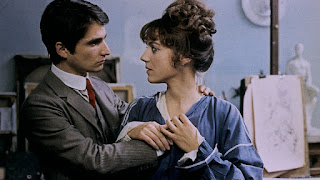Very much another go at Jules and Jim – Truffaut again adapting a book by Henri-Pierre Roché with his writing partner Jean Gruault. This is set at the turn of the 20th century and is in full costume-drama mode. Beyond a couple of outré radial wipes the direction and editing is subdued, and some scenes are so static they feel almost like tableaus or paintings. There are occasional misfires, like the gauche zoom to a bloody sheet when Anne loses her virginity. The rapid-speaking third person narrator makes a return from Jules and Jim, and the shots of the book from which the film is adapted in the opening credits emphasise the literary qualities of the film.
It's another love triangle, not so much a ménage à trois as in Jules and Jim but a two sisters falling in and out of love with a young man. Muriel is more worldly and outgoing – she becomes a sculptor that takes many lovers and has adventures in Persia. Anne is more intense – with a religious sensibility that fills her with guilt about her sexuality. Jean-Pierre Léaud is absolutely wonderful as the dashing Claude, floating about like the perfect gentleman. His character is precision-designed to have women fall in love with him, but Léaud is also good at demonstrating a teenager's confusion about the prospect of marriage and children. His composure is rattled by the mercurial Anne, who confronts him and leaves him at the end.
The film was a flop, but has a good reputation. Anne and Muriel don't have the mad charisma of Jeanne Moreau's Catherine, but their desires and heartbreaks are understandable and interesting nonetheless. This being Truffaut, there is a death at the end, and as usual with him it's a bit random – adding a weird unearned melancholy to the closing moments. Truffaut was obviously affected deeply by this strange romance, and was hurt by the indifference that greeted his film. To me it is most notable and unusual in its frank attitude to sex in what is otherwise a classic costume drama, suggesting that this period was more sexually liberated than we might initially assume.

No comments:
Post a Comment